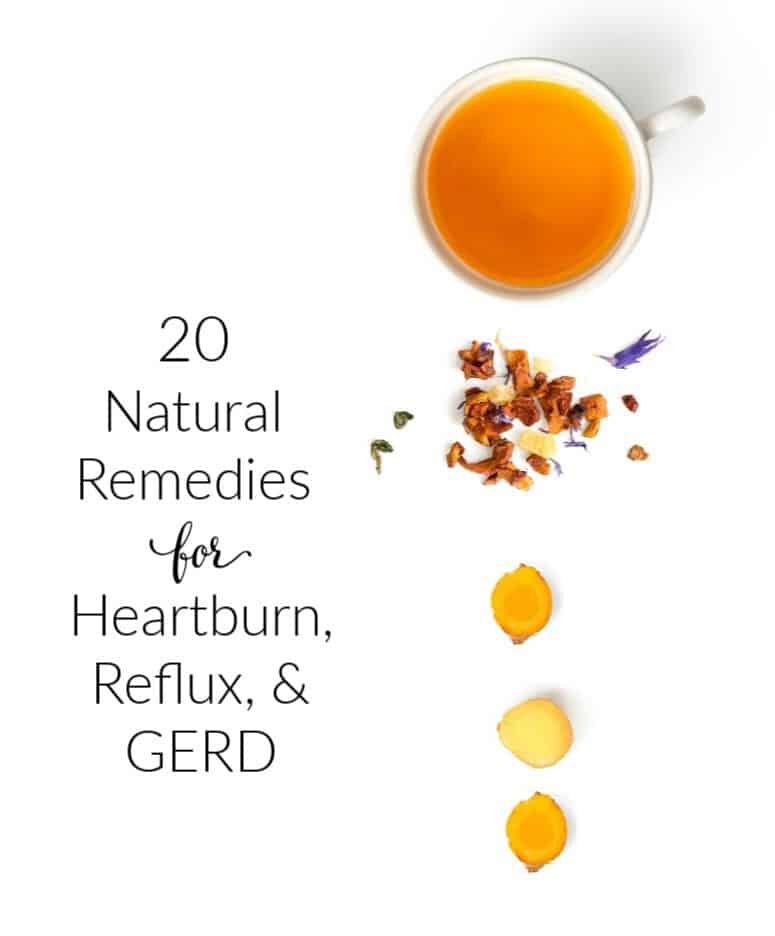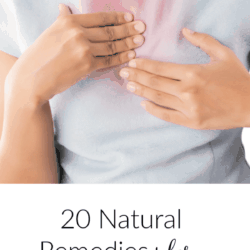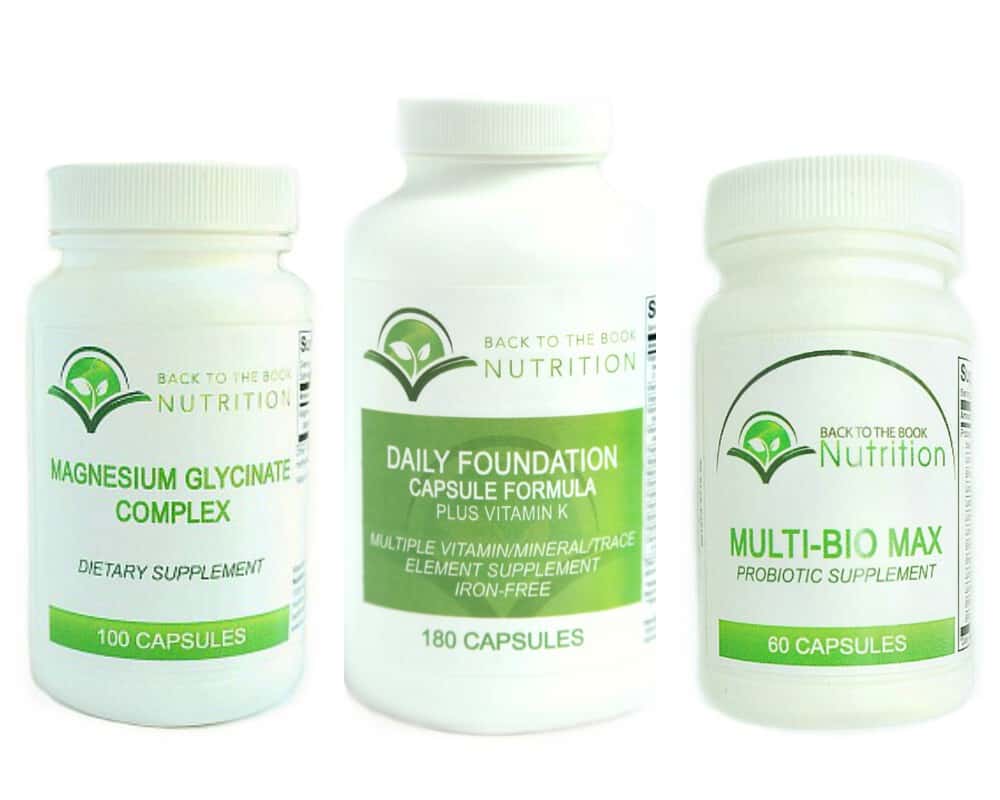Looking for natural remedies for heartburn, reflux, and GERD? You’re in the right place! We’re sharing 20 different food, lifestyle, supplement, and holistic treatment modalities to address the root cause of your symptoms and get you relief!

Note from Dena: This post was co-written with Pallavi Abraham, PhD and Dietetic Intern, as part of a research partnership between Back To The Book Nutrition and post-graduate nutrition students from the University of Houston.
More and more people are searching for natural remedies that address the root causes of heartburn, reflux, and GERD without all the side effects of most prescription and over the counter medications that just aim to suppress symptoms. If you’re one of them, read on!
Conventional Medical Approach to Heartburn, Acid Reflux, and GERD
I’m the first to say, medications have their place. But, in the case of heartburn and reflux, they are grossly overused (remember, excess acid production is not the root cause of heartburn and reflux in most people!), and many have serious side effects that can actually make some of the root causes worse in the long run.
Common Reflux Medications (1,24)
- Antacids that neutralize acid, over the counter (OTC) – These medications neutralize the stomach acid providing quick relief from heartburn. Overuse of these can cause side effects such as stomach cramps, constipation, diarrhea and change in stool color. Examples: Mylanta, Tums, and Rolaids.
- Antacids that coat the stomach, prescription – This medication can coat the stomach to protect from acid damage and is often used when an ulcer is present. Example: Carafate and Orafate.
- H-2 receptor blockers, prescription and OTC – These reduce the amount of acid produced in the stomach. Their effect is not felt as quickly as the antacids, but offer relief for up to 12 hours. Prescription examples: Famotidine (Pepcid), Cimetidine (Tagamet), Ranitidine (Zantac) and Nizatidine (Axid). OTC examples: Famotidine (Pepcid AC), Cimetidine (Tagamet HB), Rantidine (Zantac 75), and Nizatidine (Axid AR).
- Proton pump inhibitors (PPIs), prescription and OTC – For those diagnosed with GERD, PPIs are the standard medical treatment. These block acid production in the stomach, allowing the esophagus to heal as acid reflux decreases. Prescription examples: Esomeprazole (Nexium), Lansoprazole (Prevacid), Omeprazole (Prilosec, Zegerid), Pantoprazole (Protonix), Rabeprazole (Aciphex) and Dexlansoprazole (Dexilant). OTC examples: Lansoprazole (Prevacid 24HR), and Omeprazole (Prilosec OTC).
- Combination Antacid/Acid Reducers, OTC – contain both antacid and acid reducer. OTC Examples: Pepsid Complete OTC and Zegerid OTC
- Muscle relaxant/Anti-spasmotic , prescription– This is a prescription medication that helps prevent the LES from opening to reduce acid reflux. Prescription examples: Baclofen (Lioresal, Gablofen).
- Prokinetics, prescription – These medications help move things through the GI tract more quickly by blocking the neurotransmitter Dopamine. Speeding up the motility reduces the risk of gas, bloating, abdominal pressure, and reflux after meals. Prescription examples: Domperidone (Motilium), Metoclopramide (Reglan, Maxeran), and Levosulpiride (Levobren).
Side Effects of Reflux Medications
- Anemia – PPI users have a 250% higher chance of iron deficiency than non users (2).
- B-12 and other nutrient deficiencies – some human studies have shown PPI users to have higher rates of deficiencies in B-12, calcium, magnesium, and other nutrients, particularly in those who use them for more than one year (3).
- Small Intestinal Bacterial Overgrowth (SIBO) – Acid lowering medications like PPIs have shown to result in bacterial overgrowth (4).
- Bone fracture – long term use of PPIs for 5 years or more significantly increase the risk of hip fractures and osteoporosis associated bone fractures (5).
- Pneumonia– use of acid-reducing medications increased hospital-associated pneumonia significantly (6).
- Clostridium difficile (C.diff) – Taking acid lowering medications doubles the risk of C. diff infections (7).
- Celiac Disease – Both H-2 blockers and PPI’s increase risk of Celiac Disease (23).
- Rebound symptoms and addiction – discontinuation of the acid-lowering medication, can trigger a massive production of acid in the stomach and flare up reflux symptoms (8).
- Gastric cancer – long-term PPI use may be an independent risk factor for gastric cancer. Studies showed that people using PPIs for a long time had more than twice (2.44) the risk of developing stomach cancer, whereas users of H2 blockers were not have an increased risk (9).
- Higher death rate? – Using PPI’s for more than one year increased rate of death by 50% in one human study (10). Newer research that corrects for interfering variables suggests increased death rates among long term PPI users aren’t significant (29).
- Other – Several medications above may result in more minor symptoms such as headaches, skin rashes, dizziness, nausea, vomiting, abdominal pain or cramping, mood changes, fatigue and drowsiness, disturbed sleep.
These damages of acid-lowering medications, in particular PPIs, are concerning, and warrant the consideration of safe, natural, and effective approaches for heartburn and reflux.

20 Natural Remedies for Heartburn, Reflux, and GERD
Once you’ve identified the specific root cause your heartburn, reflux, or GERD, a holistic intervention that combines diet, lifestyle, and supplementation can be chosen. The first ten remedies listed below have very little risk and are helpful steps for just about anyone dealing with heartburn and reflux. The remaining remedies are more specific to various root causes of heartburn and reflux.
1. Change your Diet
Eat Real Foods
If you’re not already doing so, switch to a real food diet rich in vegetables and other plant foods, high quality meats, seafood, eggs and dairy, and with minimal sugar and refined carbohydrates. These basic changes alone can bring significant relief for many people.
Remove your Food Triggers
Experiment with additional diet changes to see whether certain foods trigger your reflux more than others. Keeping a food and symptom journal can be very helpful in this process.
Common reflux triggers:
- High acid foods – tomatoes, citrus fruits, onions, garlic, caffeine, chocolate, alcohol, etc.
- High fat foods – fried or greasy foods, heavy sauces, oils, etc.
- High FODMAP foods – a 30 day trial of the Low FODMAP diet to remove certain types of carbohydrates that can cause gas, bloating, and reflux may be helpful, especially if Small Intestinal Bacterial Overgrowth (SIBO) if the cause of your reflux.
2. Correct Nutrient Deficiencies
Deficiencies in zinc, B vitamins, and magnesium can all contribute to heartburn and reflux. Testing for these and correcting them if needed can help optimize digestion and reduce reflux.
Want to get tested for nutrient deficiencies? Schedule a free Discovery Call and let’s talk details!
3. Reduce Stress
As stress goes up, so does reflux. Managing stress is absolutely critical to overcoming reflux (11). Managing your overall stress load, as well as reducing stress at meal times are both important.
Want practical guide to help reduce and manage your stress?
Download your free, 3-Step Guide to Stress Management!
4. Don’t Lie Down After Meals
This can allow a weak LES to flap open, triggering acid reflux and heartburn. Either sit up straight or go for a walk after the meal.
5. Lose weight
If overweight or obesity is the cause of acid reflux, then losing weight can help reduce abdominal pressure and improve acid reflux symptoms.
6. Wear loose clothing
Avoid wearing tight clothes, especially around your abdomen as they can constrict your abdomen, putting pressure on your stomach and LES, triggering reflux.
7. Sleep on your left side
Consider sleeping on your left side as this position is shown to be favorable in reducing acid reflux.
8. Quit Smoking
This helps prevent damage of the LES and controls acid reflux.
Note: This post contains affiliate links. By making purchases through these links, you pay the same amount for products, but a small portion of the sale will be sent my way to help support the mission of Back To The Book Nutrition. Thank you!
9. Take Quality Vitamin and Mineral Supplements
Supplementing with well-absorbed forms of vitamins (i.e., methylated folate and B vitamins, preformed vitamin D3, etc.) and minerals (i.e., magnesium glycinate, calcium, etc.) can help neutralize excess stomach acid and help correct nutrient deficiencies associated with reflux and reflux medications. My Daily Foundation Multivitamin-mineral and Magnesium Glycinate are a perfect combo for this.
Order Daily Foundation Multivitamin + Magnesium Glycinate here!
10. Try Probiotics
Probiotic supplements may be beneficial, especially if you suspect that Small Intestinal Bacterial Overgrowth SIBO or other overgrowth of bacteria or yeast could be causing your reflux (12).
Buy lactobacillus based probiotics and spore based probiotics here.
11. Fix Your Gut
If you still have symptoms after improving your diet and adding the supplements listed above, consider getting some testing to identify other issues in the gut that need to be addressed. I explain to clients often that nothing exists in isolation in the gut – simply testing for one organism like H.Pylori, etc. – is likely to overlook other co-existing imbalances or overgrowths. That’s why I recommend a comprehensive stool test like the GI MAP to help you see a full picture of H.Pylori, bacteria, yeasts, parasites, and a number of digestive health markers for enzyme production, immune function, leaky gut, and more. Comprehensive testing like this can help you and your practitioner choose the most effective and efficient way to address the root cause(s) of your heartburn and reflux.
Want a GI MAP comprehensive stool test? Schedule a free Discovery Call and let’s talk details!
12. Try Herbs and Supplements that Soothe the Esophagus
- Deglycrrhizinated Licorice (DGL) – helps by increasing mucus secretion which is our body’s powerful natural antidote to acid and thus reduces reflux. Treatment of gastric ulcer patients with Caved-S (tablets containing DGL) led to ulcer healing in these patients. Taking DGL chewable tablets 20 minutes before meals have shown benefits in some people (13, 14).
- Slippery Elm – Although research evidence is lacking, slippery elm has been used for centuries, in America, as a remedy for gastritis, heartburn, and reflux. Similar, to DGL, it acts by increasing mucus secretion in the stomach and protects it from high acidity (15).
- Marshmallow Root – high in mucilage content and is shown to reduce inflammation of the stomach lining, healing ulcers by forming a protective lining on the digestive tract. Drinking 1 cup of cold marshmallow root infusion, first thing when you wake up, another halfway through the day, and a third before bed everyday for sometime, can help relieve acid reflux symptoms. A quick hot infusion prepared by dissolving one tablespoon in 1 cup of water can work too (15, 16).
- Mastic gum – Shown to have many health benefits due to its antioxidant and anti-inflammatory properties. Source: (17). Mastic gum may be taken safely in dosages between 1 gm to 5 gm daily, to reduce heartburn, eradicate Helicobacter pylori (a bacteria that can cause acid reflux), and may even help resolve stomach ulcers (18-20).
- Combination Products – Some supplements combine several of the above products, along with zinc and other gut healing agents, into a single product. These are available in capsule or powdered form, but I find the powdered versions can be especially helpful for clients. Examples: GI Revive, Heartburn Tx, and Optimal GI Powder (pictured below).
13. Consider Digestive Support Supplements
These are especially helpful for those have determined low stomach acid is the root cause of their symptoms. Work with a practitioner to determine whether and how much of these are right for you.
- Apple Cider Vinegar (ACV) – ACV can serve as a supplemental acid when stomach acid (HCl) is too low. Scientific evidence is lacking for this remedy, but many people report an improvement in symptoms when they take between 1 teaspoon and 1 tablespoon of ACV in 8oz of water before meals. Do not drink it if suffering from moderate to severe heartburn, or if you have a stomach ulcer (21).
- Hydrochloric Acid (HCl) – Taking supplemental HCl may return low stomach acid levels to optimal and help with tightening of the LES so less acid refluxes back up to the esophagus. Despite, the lack of clinical trial evidence showing its efficacy, it is taken by many people to achieve relief from reflux. This should be done with caution and only under the care of a practitioner as taking too much can exacerbate damage to the esophagus or stomach lining. Do not supplement with HCl if you have a stomach ulcer or are taking medications that are known to damage the GI lining (aspirin, ibuprofen, other NSAIDs, corticosteroids, etc.) (8). (pictured below)
- Digestive Enzymes – If stomach acid is low, enzyme levels may also be low, which will compromise your ability to digest and absorb nutrients. Taking digestive enzymes has shown to prevent heartburn, but should be used with caution if you have esophageal damage or a known ulcer (22). (pictured below)
- Ox Bile Supplement – Low stomach acid reduces bile production, which can impair digestion and absorption of fats in your diet. Taking Ox bile supplements improves digestion of fat in your food, reduces inflammation, and can be especially helpful if cholestasis (sluggish bile movement from the liver/gallbladder) is the root cause of your symptoms. (pictured below)
- Combination Digestive Aid Supplement – some supplements combine HCl, digestive enzymes, and ox bile in a single product – if you’ve already determined that you need all three of these, a combination product may be more convenient. Example: Pro-Gest (pictured below).
14. Try Melatonin, Ginger, and other Supplements to Improve GI Motility
Melatonin, ginger, and a few other natural products have been shown to act as natural prokinetic agents, helping to move things through the GI tract more quickly. This can help reduce gas, bloating, abdominal pressure, and reflux. These can be taken in food form, or as teas, tinctures, or capsules. See examples of melatonin, ginger, and D-Limonene, as well as blended products like MotilPro that combines ginger with 5-hydroxytryptophan (5-HTP) and Pyridoxal-5-Phosphate (P5P) can be used below. (24, 25)
15. Use Baking Soda + Water for Quick Relief
This won’t address the root cause, but can help neutralize excess acid to relieve your symptoms in a pinch. Mix 1/2 teaspoon baking soda with 1/4 cup water and drink. Wait 5 minutes, then repeat if needed.
16. Support Liver Function + Dissolve/Remove Gallstones
If sluggish bile flow from the liver and/or gallbladder (“cholestasis”), or gallstones, are contributing to your reflux symptoms, you’ll need to address these to get complete relief. Various supplements and natural protocols can help to support the liver and gallbladder, as well as dissolve gallstones. It’s best to work with a holistic practitioner like Dena to determine which of these may help you.
17. Optimize Thyroid Function
Correcting hypothyroidism or suboptimal thyroid function with optimal nutrition, stress management, thyroid supportive supplements, and medications if needed can all help speed up the rate at which food moves through the GI tract, and can also help the LES sphincter to contract better. In some cases, this can reduce or resolve heartburn/reflux.
18. Correct hormone imbalances
If estrogen, progesterone, or testosterone aren’t optimal, work with your provider to correct these using food, supplements, lifestyle, and hormone replacement if appropriate to see if this helps your indigestion and reflux.
19. Address Underlying Autoimmunity
If scleroderma or other autoimmune conditions are affecting gut health in general or GI motility specifically, it’s important to get your autoimmunity under control. Get my top 8 tips for addressing autoimmunity here!
20. Get Chiropractic Care
Chiropractic manipulation may help improve communication between the nervous system and the GI tract, and a number of small studies have showed improved digestion and decreased reflux symptoms (27). Additionally, some chiropractors are trained to apply pressure in certain areas (“visceral manipulation”) to correct hiatal hernias, though evidence for this technique is mostly anectdotal.
21. Try Myofascial Release Therapy (MRT)
A physical therapist or other practitioner trained in myofascial release can apply heavy pressure to the abdomen using this specialized technique. A small study showed MRT significantly reduced GERD symptoms and the need for PPI medications (26). More study is needed, but this low-risk intervention may be a good addition if other efforts aren’t providing full relief of your symptoms. Find a MRT therapist near you using this tool.
22. Get Acupuncture
Several studies have evaluated acupuncture as a stand-alone therapy as well as an adjunct to reflux medications. Results show acupuncture speeds movement of food through the GI tract, reducing reflux symptoms and the need for medication, making acupuncture a low risk, “might help, won’t hurt” consideration (28).
The Bottom Line
If you suffer from acid reflux or GERD, you may benefit from trying these natural remedies in addition to or instead of conventional treatment. Consult with a trained holistic practitioner to find what blend of conventional and natural approaches are best for you as you seek to identify and overcome the root cause of your symptoms.
Want to know which of these will work best for you?
Holistic Nutrition Coaching + Functional Medicine Testing can help!
Schedule a free, 10 minute call and let’s talk details!
About the Co-Author

Pallavi Abraham is currently a dietetic intern at the University of Houston. Driven by real life events, she embarked on her journey to become a dietitian after earning a PhD in Biochemistry and gaining extensive experience in cancer research at The University of Texas MD Anderson Cancer Center. She is passionate about becoming a clinical dietitian and practicing in the field of integrative and functional nutrition. Pallavi is married with two school going kids and in her free time loves to travel with her family.
Disclaimer: Information on this site is intended only for informational purposes and is not a substitute for medical advice. Always consult with a trusted healthcare provider before implementing significant dietary change. Read additional disclaimer info here.
References
- WebMD: Treating Heartburn with Over the Counter Medicine. https://www.webmd.com/heartburn-gerd/guide/treating-heartburn-over-counter-medicine
- Lam JR, et al. Proton Pump Inhibitor and Histamine-2 Receptor Antagonist Use and Iron Deficiency. Gastroenterology. 2017 Mar;152(4):821-829.e1. doi: 10.1053/j.gastro.2016.11.023. Epub 2016 Nov 24. PubMed PMID: 27890768. https://www.gastrojournal.org/article/S0016-5085(16)35392-6/fulltext?referrer=https%3A%2F%2Fwww.ncbi.nlm.nih.gov%2F
- Heidelbaugh JJ. Proton pump inhibitors and risk of vitamin and mineral deficiency: evidence and clinical implications. Ther Adv Drug Saf. 2013 Jun;4(3):125-33. doi: 10.1177/2042098613482484. PubMed PMID: 25083257; PubMed Central PMCID: PMC4110863. https://www.ncbi.nlm.nih.gov/pmc/articles/PMC4110863/#bibr35-2042098613482484
- Su T, et al. Meta-analysis: proton pump inhibitors moderately increase the risk of small intestinal bacterial overgrowth. J Gastroenterol. 2018 Jan;53(1):27-36. doi: 10.1007/s00535-017-1371-9. Epub 2017 Aug 2. Review. PubMed PMID: 28770351. https://link.springer.com/article/10.1007%2Fs00535-017-1371-9
- Targownik LE, et al. Use of proton pump inhibitors and risk of osteoporosis-related fractures. CMAJ. 2008 Aug 12;179(4):319-26. doi: 10.1503/cmaj.071330. PubMed PMID: 18695179; PubMed Central PMCID: PMC2492962. https://www.ncbi.nlm.nih.gov/pmc/articles/PMC2492962/
- Herzig SJ, et al. Acid-suppressive medication use and the risk for hospital-acquired pneumonia. JAMA. 2009 May 27;301(20):2120-8. doi: 10.1001/jama.2009.722. PubMed PMID: 19470989. https://www.ncbi.nlm.nih.gov/pubmed/19470989
- Deshpande A, et al. Association between proton pump inhibitor therapy and Clostridium difficile infection in a meta-analysis. Clin Gastroenterol Hepatol. 2012 Mar;10(3):225-33. doi: 10.1016/j.cgh.2011.09.030. Epub 2011 Oct 20. PubMed PMID: 22019794. https://www.ncbi.nlm.nih.gov/pubmed/22019794
- Asprey, Dave. Biohack Your Acid Reflux: Treatment without dangerous drugs. https://blog.bulletproof.com/acid-reflux-treatment-diet-without-drugs/#_ednref8
- Medical News Today: Common Acid Reflux Drug Increases Stomach Cancer Risk. https://www.medicalnewstoday.com/articles/319923.php
- Xie Y, et al. Risk of death among users of Proton Pump Inhibitors: a longitudinal observational cohort study of United States veterans. BMJ Open. 2017 Jul 4;7(6):e015735. doi: 10.1136/bmjopen-2016-015735. PubMed PMID: 28676480; PubMed Central PMCID: PMC5642790. https://bmjopen.bmj.com/content/7/6/e015735
- Eun, M.S., et al. The Association Between Reflux Esophagitis and Psychosocial Stress. Dig Dis Sci. 2013 Feb; 58(2): 471–477. https://www.algaecal.com/expert-insights/acid-reflux/
- Norton, D. Ultimate Guide to Probiotic Supplements. https://www.backtothebooknutrition.com/best-probiotics/
- Morgan AG, et al. Comparison between Cimetidine and Caved-S in the treatment of gastric ulceration, and subsequent maintenance therapy. Gut. 1982 Jun;23(6):545-51. PubMed PMID: 7042486; PubMed Central PMCID: PMC1419696. https://www.ncbi.nlm.nih.gov/pmc/articles/PMC1419696/
- Kresser, C. Get Rid of Heartburn and GERD Forever in Three Simple Steps. https://chriskresser.com/get-rid-of-heartburn-and-gerd-forever-in-three-simple-steps/
- Myers, Amy. 8 Supplements to Heal a Leaky Gut. https://www.amymyersmd.com/2013/05/8-supplements-to-heal-a-leaky-gut/
- Wells, K. Marshmallow Root Herb Profile. https://wellnessmama.com/15243/marshmallow-root/
- Shmuely, H., et al. Non-pharmacological treatment of Helicobacter pylori. World J Gastrointest Pharmacol Ther. 2016 May 6; 7(2): 171–178. https://www.ncbi.nlm.nih.gov/pmc/articles/PMC4848239/
- Stevens, M. 2 Supplements to Support Gut Healing. https://eatbeautiful.net/2017/04/30/2-supplements-support-gut-healing-use-mastic-gum-deglycerized-licorice/
- Paraschos S, et al. In vitro and in vivo activities of Chios mastic gum extracts and constituents against Helicobacter pylori. Antimicrob Agents Chemother. 2007 Feb;51(2):551-9. Epub 2006 Nov 20. PubMed PMID: 17116667; PubMed Central PMCID: PMC1797732.
https://www.ncbi.nlm.nih.gov/pmc/articles/PMC1797732/pdf/0642-06.pdf - Dabos KJ, et al. The effect of mastic gum on Helicobacter pylori: a randomized pilot study. Phytomedicine. 2010 Mar;17(3-4):296-9. doi: 10.1016/j.phymed.2009.09.010. Epub 2009 Oct 29. PubMed PMID: 19879118.https://www.sciencedirect.com/science/article/pii/S0944711309002396?via%3Dihub
- Medical News Today: Does Apple Cider Vinegar Help with Acid Reflux? https://www.medicalnewstoday.com/articles/324034.php
- 1MD.org: Daily Digestive Enzymes Help Reverse GERD Damage. https://1md.org/article/digestive-enzymes-gerd-guide-1md
- Lebwohl, B. et al., Use of Proton Pump Inhibitors and Subsequent Risk of Celiac Disease. Dig Liver Dis. 2014 Jan;46(1):36-40. https://www.ncbi.nlm.nih.gov/pmc/articles/PMC3947159/
- SIBO Survivor: Prokinetic Agents. https://sibosurvivor.com/prokinetic-agents/
- Thor, P.J., et al. Melatonin and serotonin effects on gastrointestinal motility. J Physiol Pharmacol. 2007 Dec;58 Suppl 6:97-103. https://www.ncbi.nlm.nih.gov/pubmed/18212403
- Martinez-Hurtado, I., et al. Effects of diaphragmatic myofascial release on gastroesophageal reflux disease: a preliminary randomized controlled trial. Scientific Reports v9, Article number: 7273 (2019). https://www.nature.com/articles/s41598-019-43799-y
- Angus, K., et al. What effect does chiropractic treatment have on gastrointestinal (GI) disorders: a narrative review of the literature. J Can Chiropr Assoc. 2015 Jun; 59(2): 122–133. https://www.nature.com/articles/s41598-019-43799-y
- Yin, J. and Chen, J.D.Z.Gastrointestinal Motility Disorders and Acupuncture. Auton Neurosci. 2010 Oct 28; 157(1-2): 31–37. https://www.ncbi.nlm.nih.gov/pmc/articles/PMC2906692/
- Lo, C. H., Ni, P., Yan, Y., Ma, W., Joshi, A. D., Nguyen, L. H., Mehta, R. S., Lochhead, P., Song, M., Curhan, G. C., Cao, Y., & Chan, A. T. (2022). Association of Proton Pump Inhibitor Use With All-cause and Cause-specific Mortality. Gastroenterology, S0016-5085(22)00729-6. Advance online publication. https://doi.org/10.1053/j.gastro.2022.06.067




Great post. Thanks for documenting heartburn remedies. Literally every second person in my family has this problem.
Very useful content
Thanks for the sharing
I expressly resort to the islands when burning…
These are all great and helpful remedies to cure heartburn, reflux and gerd. I will share and recommend this to my friends.
As someone that has suffered from these conditions for most of their lifetime it’s nice to find a list of different things that can help!
This is good read for me as my girlfriend suffers heartburn a lot. Thanks for sharing. Will recommend it.
Thank you very much for the tips..I m having acidity issues will try your recommendation.
These are some great supplements to help with all these acid reflux and heartburn
Wow, thank you for these wonderful tips on combating heartburn. I used to get a lot of it but I don’t get it that much anymore. It could have been from stress.
You bring up some great points and have some helpful points. I personally have not suffered from heartburn lately but when i do i will remember these tips.
I do suffer from heartburn when I eat some starchy foods and I have learned to avoid them. These tips are really helpful.